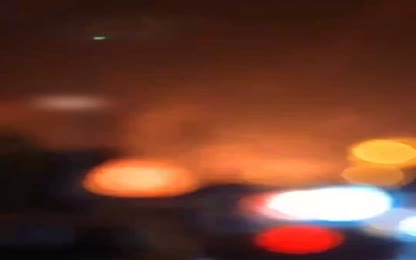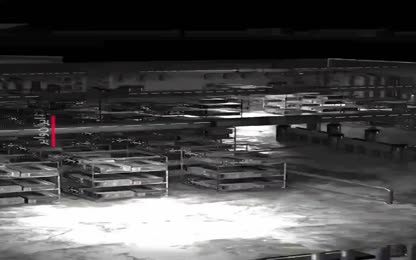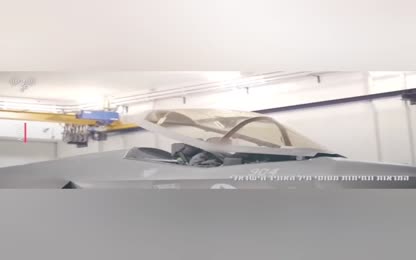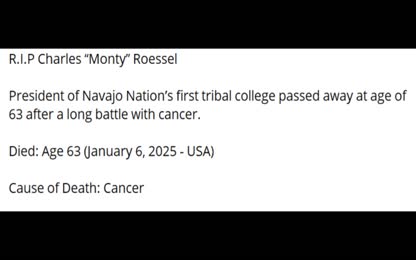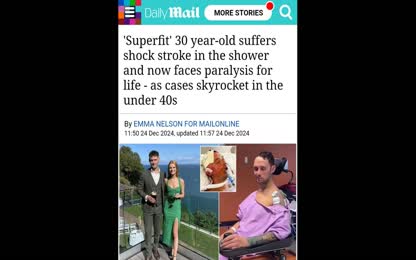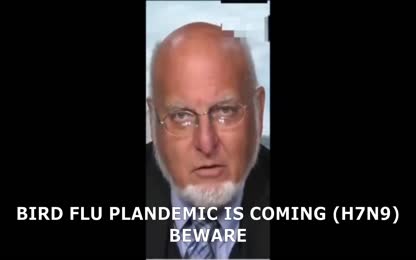Advertisement
compilation of newscasts promoting implantable microchips
compilation of mark of beast newscasts
- Category: Uncategorized,Pursuit of Truth,Hidden Message / Hidden
- Duration: 14:15
- Date: 2021-02-22 12:44:30
- Tags: implantable microchip mark of the beast revelation
4 Comments
Video Transcript:
Nonviolent offenders who don't even have to be behind bars. They could be closely tracked by a global positioning satellite that can spot them down to a few feet. Electronic boundaries like those we impose on pets could be set up for these inmates, and surgically in planity electrodes could even shock them until they return to where they're supposed to be. One thing we could imply would be a subliminal implant. In other words, basically a message of being tied into the subconscious constantly. Do the right thing, do what's required of you be a good citizen, don't disobey the law. Well, this slug would love to make you do what's required of you and crammy in a super max prison. Our prison population's jumped to 6.5 million in the last two years. Now, they're talking about robots controlling us and in planning the entire population with microchips or your four alkyda. Oh, we're crazy. We're making it up. They never pedal microchips. Something has to change though. They have to find a better way to identify the bad guys or the rest of us are going to stay home and watch the world go by on television. But we need some system for permanently identifying safe people. Most of us are never going to blow anything up and there's got to be something better than one of these photo IDs, attack to somewhere maybe. The studies used an American device to scan the eyes of travelers. I wouldn't mind having something planted permanently in my arm that would identify me. If we don't do something, people are going to stop flying. If they stop flying and I don't go to the giant's games, it means the bastards of war. Yeah, we're not going to let you in, buddy. We saw what you just implied. We're without kind of we don't take the microchip. Students Hannah Herving is also freshly chipped and now just needs to program it to open doors. Although importantly for a future career, it does already connect to her LinkedIn. Some people say I'm mad that I don't know if it's safe and all that, but people have been putting these chips into animals for 20 years. So I'm not worried about that. The long-term goal is for the new chips to help provide medical care in remote communities. They're already getting under the skin of the Swedes. They may soon become just another normal part of modern life and of the human body. Paul Reese, Al Jazeera, Lund, Sweden. We will finally complete the biometric entry exit visa tracking system which we need desperately. The US Congress has required biometric entry exit visa tracking systems, but it has never been completed. The politicians are all talk, no action, never happens, never happens. Hillary Clinton, all talks. Unfortunately, when there is action, it's always the wrong decision. Do you have a notice? In my administration, we will ensure that this system is in place and I will tell you, it will be on land, it will be on sea, it will be in air, we will have a proper tracking. If I had a younger, a young children out today, I would put a chip in my shoulder. I certainly would, this one would just change the rest. There is an app that's out there. I think it's such a great idea. It's so smart. It's a very actual facial recognition. So what you do is if you lose your dog, first of all, you snap a picture of your dog before you go to the bathroom. All right. If you lose your dog, you post it and this app collects the pictures of dogs that are missing or found and they do a facial recognition thing and they sink them up and they've been able to get 600 dogs back to their owners. Since I started it, which is so great. I still think that they have the chip. It's the way they go, right? You're right. I've done it yet. But my dogs never leave the yard, but they stay close down. Yes, they do. If I had a younger, a young children out today, I would put a chip in my shoulder. You know what? I certainly would. This one would just change so much and I tell you, I have so educated these days on the human traffic and graduation. Look into it. I mean, because so much can happen within 20 or 40 years. I'll have you my never see your child again. If your child is a chip and it's not painful, they can find that child and keep it from being disappeared in some place. You know what? Yeah. Let's just look into it. I'm not telling you to do it. Just look at so frightening, the statistic. All right. Well, don't forget this Friday we're going to give it away. We're getting five lucky viewers this week. If I had a younger, a young children out today, I would put a chip in my shoulder. You know what? I certainly would. We're really pioneers in a brave new world. They have volunteered to be the first ever to have microchip identification devices implanted into their body. After 9.11, I was really concerned with the security of my family. Topsy of far lieutenant Diane Sawyer for eight minutes sat there in a sickening fashion with this poor pathetic family as they discussed how they were all taking microchips because they believed in America and wanted to stop the terrorist. As in gentlemen, this is something out of a science fiction horror movie. They're taking tips because they stand with the mother government. I'm living in Nazi Germany twilight zones. Now politicians are announcing that they want to get shipped. We roll, but let's go to the phones quickly and we go to Stephen. Stephen, welcome tonight. Talk. Hello, Stephen. How are you doing? Great. I was wondering what the sisters thought about when they're going to start them planning us with microchips and we're going to go into the cashless society. Stephen, great call. I will have what you're having. Let's go to Mike. Mike, welcome tonight. Talk. You're on with the Vincent sisters. Hello, Mike. Yeah, Kevin. I was with my past sister. We are beginning a program today which will certainly grow into something larger and larger and that is a community contact tracing program. We've done contact tracing all along. A contact is a person who's been exposed to someone that we document to have the COVID infection. When we find someone who has a COVID infection, those people are immediately isolated. But we also work with them to figure out who their contacts were. But the purpose of this program is to bring on people. We may bring on up to 50 or even more as the program grows and as we see the needs for it. As we do more testing, we will find more and more people who have COVID-19 and again, we'll isolate every one of them and we will find every one of their contacts and we will make sure that they stay quarantined and we'll check in with them every day. We're going to do a more complete job and we're going to do a more meticulous job of making it less and less possible for others in the county to run into someone with COVID-19 infection. It's not just our county. There are going to be thousands of people hired who will be these contact investigators throughout the state. This is occurring in many, many other states as well, perhaps all of the states in our country. We will be giving intensive training to these people, identifying and finding contacts. Some of the people we find are going to have trouble being isolated. For instance, if they live in a home where there's only one bathroom and there are three or four other people living there and those people don't have COVID infection, we're not going to be able to keep the person in that home. Every person who we're isolating, for instance, needs to have their own bathroom. So we'll be moving people like this into other kinds of housing that we have available. On a coronavirus report, on a coronavirus vaccine and that one could be ready this year. If you are among those Americans who choose to get one, CBN News Medical reporter, Laurie Johnson says you may even see a big difference in the form of an RFID ship. Take a look. People who get a coronavirus vaccine may notice it looks a lot like their eye drops. They might also see an RFID ship on the package. The U.S. government has contracted AppiJet Systems of America to make 100 million pre-filled syringes to quickly distribute a coronavirus vaccine. It would use a high-speed blow-fill seal technology used in pre-filled single-use eye drops. There are eye dropper facilities in the U.S., not many, but a few, that we are going to upgrade so they can handle vaccines. Then what will happen is those facilities will make the containers right here that will hold the vaccine. We will add a needle hub to them and voila, you have a pre-filled syringe. It's ready to use. There's also space on each syringe for an optional radio frequency identification ship containing a unique serial number for each dose. It would not be injected or touched the patient. The chip would be scanned by healthcare workers in order to better track overall vaccine information. It is designed so that there is no counter-fitting. It's designed so that we'll know exactly that the right dose hasn't expired. However, that chip only refers to the dose. There's no personal information, no patient information. It's simply like a barcode. Only we know instantaneously where and when that dose has been used. That also helps public health officials know when there are outbreaks have we vaccinated enough people in those areas. The pre-filled syringes will add to the limited number of traditionally manufactured vaccine supplies such as specialized equipment to fill glass jars, stoppers, needles and syringes. People are worried about do we have enough medical glass to be able to put all of these doses of the vaccine in devils so that they can be administered. And that's a serious issue to think about right now. And as we are anticipating, if all goes well, that such vaccines may be available in millions of doses as soon as this fall. The Department of Defense says once the vaccines are made, they'll be delivered to healthcare providers nationwide with the speed and efficiency of the U.S. military. Lori Johnson CB. America has 330 million people, all of whom will likely need two to four injections. That means packaging between 660 million and 1.3 billion doses of a vaccine, which requires an enormous number of glass vials and syringes. These obstacles explain why America's assistant secretary for preparedness and response and the strategic national stockpile, both part of the U.S. Department of Health and Human Services, have teamed up with a U.S. company called Appiject Systems America to help package hundreds of millions of doses of vaccines and therapeutics fast. The partnership is called the Rapid Consortium. Rapid will build U.S.-based facilities to make a new kind of plastic-prefilled syringe at extraordinary speed. These facilities will make enough pre-filled syringes to inject every man, woman, and child in America with just the right dose 30 days after a vaccine becomes available. Plus, every pre-filled syringe can have an RFID chip attached. This will allow healthcare workers to use their mobile phones to automatically capture where and when every injection takes place, helping public health officials make more informed decisions. Rapid is what America and the world need, a public-private partnership that blends government defense expertise with private enterprise efficiency. I'm Jay Walker, the chairman of Rapid. Together, we will overcome this virus for a safer, healthier society. Missing fearless and that the way it should be, it's a level that people got to be free. You should see, well lovely, lovely, well-is it be, everyone learned to live together.









 Donate
Donate